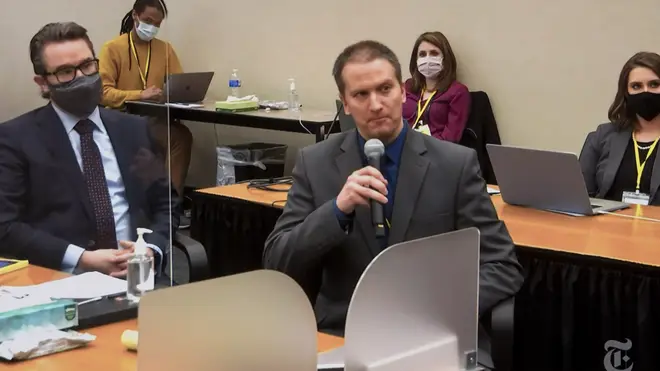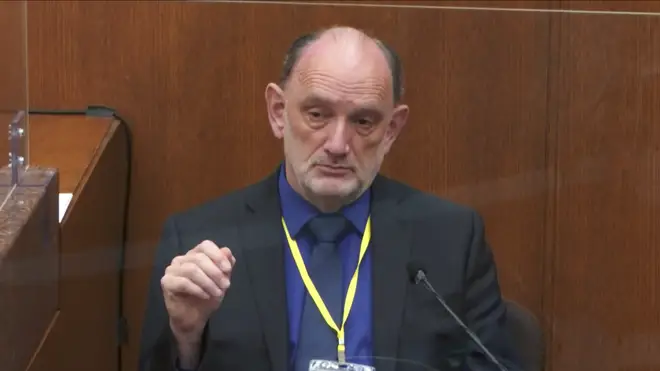
Henry Riley 4am - 7am
15 April 2021, 15:58 | Updated: 15 April 2021, 16:13

Former US police officer Derek Chauvin has declined the right to testify in his defence at the George Floyd murder trial.
The defence at the murder trial over the death of George Floyd wrapped up its case on Thursday without putting Chauvin on the stand.
Chauvin informed the court that he would not testify, saying he would invoke his Fifth Amendment right not to take the stand.
"Is this your decision not to testify?" Judge Peter Cahill asked.
"It is, your honour," Chauvin said.
Some prosecution rebuttal testimony was expected to follow on Thursday. Closing arguments are set for Monday, after which the jury will begin deliberating.
READ MORE: Derek Chauvin: Defence begins its case at George Floyd trial
READ MORE: George Floyd died from lack of oxygen after being pinned down, expert tells Chauvin trial

The decision not to testify was announced a day after a forensic pathologist testifying for the defence said that Mr Floyd died of a sudden heart rhythm disturbance as a result of his heart disease. That contradicted prosecution experts who said Mr Floyd succumbed to a lack of oxygen from the way he was pinned down.
Dr David Fowler, a former Maryland chief medical examiner who is now with a consulting firm, said on Wednesday the fentanyl and methamphetamine in Mr Floyd's system, and possibly carbon monoxide poisoning from a car exhaust, were contributing factors in the 46-year-old black man's death last May.
"All of those combined to cause Mr Floyd's death," he said.
Dr Fowler also testified that he would classify the manner of death "undetermined", rather than homicide, as the county's chief medical examiner ruled.
He said Mr Floyd's death had too many conflicting factors, some of which could be ruled homicide and some that could be considered accidental.
Chauvin lawyer Eric Nelson is trying to prove that the 19-year Minneapolis police veteran did what he was trained to do and that Mr Floyd died because of his illegal drug use and underlying health problems.

"Institutional racism" in American police force to blame for George Floyd death
Prosecutors say Mr Floyd died because the white officer's knee was pressed against Mr Floyd's neck or neck area for nine-and-a-half minutes as he lay on the pavement on his stomach, his hands cuffed behind him.
Dr Fowler listed a multitude of factors or potential ones: Floyd's narrowed arteries, his enlarged heart, his high blood pressure, his drug use, the stress of his restraint, the vehicle exhaust, and a tumour or growth in his lower abdomen that can sometimes play a role in high blood pressure by releasing "fight-or-flight" hormones.
Dr Fowler said all of those factors could have acted together to cause Mr Floyd's heart to work harder, suffer an arrhythmia, or abnormal rhythm, and suddenly stop.
Prosecutor Jerry Blackwell launched an aggressive cross-examination, attacking Dr Fowler's findings.
He got Dr Fowler to acknowledge that even someone who dies from being deprived of oxygen ultimately dies of an arrhythmia.
A number of medical experts called by prosecutors have said Mr Floyd died from a lack of oxygen because his breathing was constricted by the way he was held down.
A cardiology expert rejected the notion that Mr Floyd died of heart problems, saying all indications were that he had "an exceptionally strong heart".
But Dr Fowler said that Chauvin's knee on Mr Floyd was "nowhere close to his airway" and that Mr Floyd's speaking and groaning showed that his airway was still open. He also testified that Chauvin's knee was not applied with enough pressure to cause any bruises or scrapes on Mr Floyd's neck or back.
Chauvin, 45, is charged with murder and manslaughter over Mr Floyd's death after his arrest on suspicion of passing a counterfeit 20-dollar note at a neighbourhood market.